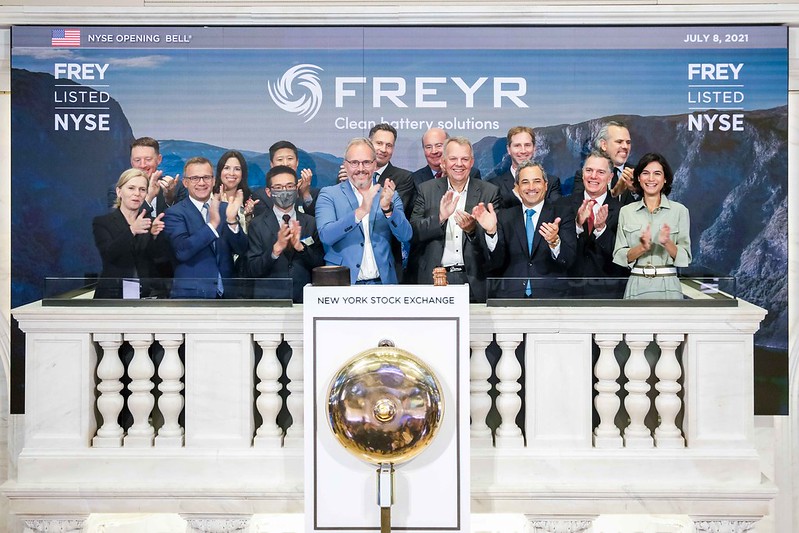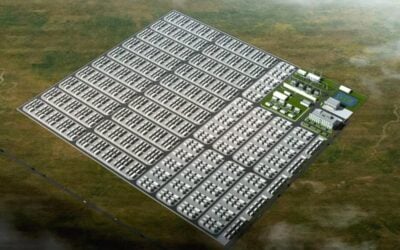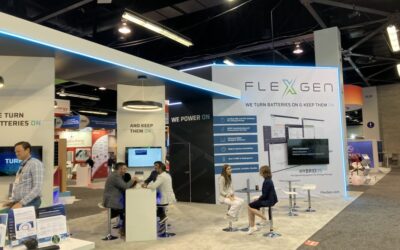
FREYR Battery is set to go ahead with construction of its first battery gigafactory in Norway, having received assurances of financial and strategic support from the country’s government.
The Norway-headquartered battery cell manufacturing startup said it has sanctioned the construction of Giga Arctic and has confirmed it will have access to more than US$1.6 billion in debt financing.
Enjoy 12 months of exclusive analysis
- Regular insight and analysis of the industry’s biggest developments
- In-depth interviews with the industry’s leading figures
- Annual digital subscription to the PV Tech Power journal
- Discounts on Solar Media’s portfolio of events, in-person and virtual
The announcement by the company came yesterday as the Norwegian government announced a new National Battery Strategy policy at FREYR Battery’s offices. Like nearby Finland, Norway has decided to promote homegrown industries in the battery value chain.
The country’s Ministry of Trade, Industry and Fisheries said that its 10-step plan could help unlock opportunities for industry with a turnover of NOK90 billion (US$9.02 billion) by 2030 (see release here, in Norwegian language-only).
Through the strategy, Norway’s export credit agency Export Finance Norway (Eksfin) has indicated that it will support FREYR with up to €400 million (US$418 million) worth of guarantees, loans, or a combination of the two.
FREYR has some large off-take agreements already in place with a number of customers in the stationary battery energy storage industry, some of which have been named, like a 28.5GWh deal with US manufacturer Powin, and a 19GWh deal with Honeywell, along with others which have not.
Although it is likely a large majority of initial demand will come from the electric vehicle (EV) sector, which is booming in Norway and growing around Europe and other territories, in an interview with this site in March, FREYR CEO Tom Einar Jensen said that up to half of its products could be sold into the energy storage system (ESS) sector over time.
Securing of financing has enabled the company to ramp up its production plans: Giga Arctic will be aimed at 29GWh annual production capacity, while a 2030 target for 200GWh annual capacity will be met from expansions and other new facilities FREYR intends to build.
The initial plan had been to build two smaller factories at the site in the town of Mo i Rana, but these will be consolidated into a single site. FREYR believes the Giga Arctic plant’s construction and commissioning will require around US$1.7 billion total capital investment. The company noted that factors including supply chain constraints and inflation have driven an uplift in the expected cost since plans were first announced.
FREYR recently also signed a renewable energy power purchase agreement (PPA) with Norwegian state-owned energy company Stakraft, and has materials supply deals in place with the likes of Glencore.
The manufacturer aims to run all of its production off renewable energy and is partnered with US battery technology platform company 24M, which has developed a process for making batteries with so-called SemiSolid electrodes, aiming to produce more energy dense cells at lower cost and with lower energy use required.
In his March interview with this site, CEO Jensen said FREYR Battery’s initial production lines would produce lithium iron phosphate (LFP) cells but retain the option to add nickel manganese cobalt (NMC) manufacturing capacity.
However, a press release sent yesterday to Energy-Storage.news noted that the initial planned production capacity at the first two gigafactories would be NMC. A request for clarification from the company had not been responded to by the time of publication.
China’s Gotion to make ESS, EV products at 18GWh site in Germany
In related news, this week Chinese battery company Gotion High-Tech said it will establish production bases in Germany that will make LFP products for the stationary energy storage and e-mobility markets.
Along with launching a ‘portable’ home battery energy storage product range, the company announced it will build up to 18GWh of annual production capacity at its existing site in the Lower Saxony university town of Göttingen, in two phases.
Preparation of the brownfield site for construction will begin before the end of this year, and an initial 3.5GWh of production put into action by September 2023, before subsequent phases bring that up to 6GWh and then add another 12GWh.
By 2025, Gotion High-Tech aims to have 300GWh of production capacity worldwide, siting some 100GWh of that in overseas territories such as Germany.
Meanwhile, LG Energy Solution has revealed that it is reconsidering investment into a production plant for EV batteries in Arizona. The plant is one of several the Korean company is putting into action in the US. Reuters, which reported the company’s potential change of heart this week, said analysts it had spoken to considered rising inflation to likely be the main cause.






